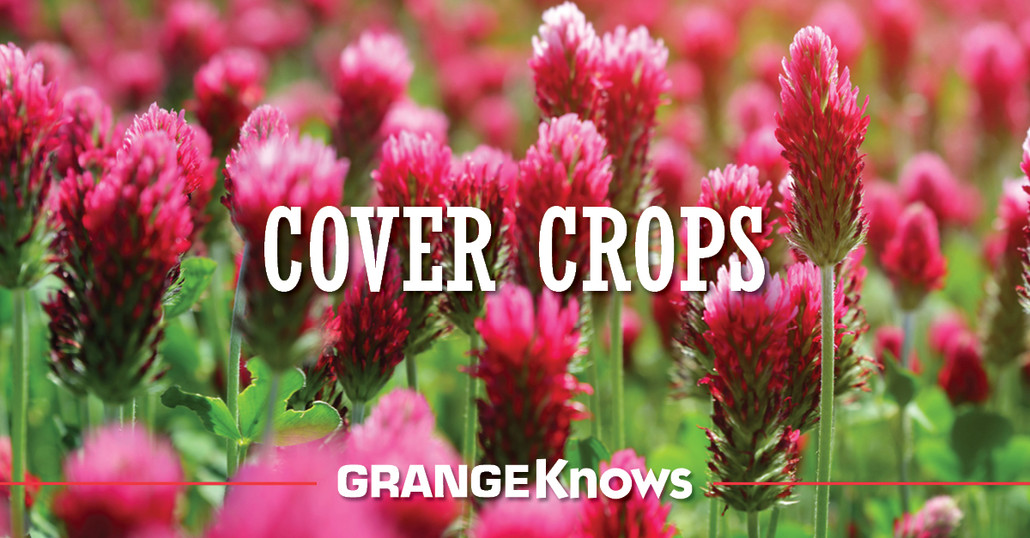
Cover Crop to Improve Soil Diversity
Posted by Grange Co-op on 19th Feb 2020
Cover crop will provide many benefits to prepare soils for the next marketable crop. Some benefits include reducing water runoff, improving soil diversity and adding organic matter – ultimately creating a healthier soil biosphere. Increase the success of your crops with the simple addition of Rogue Cover Crop varieties mid-February through March and again in mid-September through October.
Cover crops reduces water runoff from fields, in turn diminishing erosion and protecting waterways. Root systems of cover crops create pores in the soil, allowing better water infiltration and deeper depth, which conserves more water in the soil. Cover crops can also facilitate the disruption of insect and disease cycles. While growing, cover crops can also provide competition to weed species.
Improving soil diversity by growing different plant species enables crop rotation benefits. Applying an early spring and fall cover crop advances soil diversity without missing or replacing the summer grow season. Many invasive weed species, such as spotted knapweed and nutsedge, produce Allelochemicals which can have detrimental effects on other plant growth. Cover crops can help reduce Allelopathic interactions.
When tilled into the soil, cover crops add organic matter, increasing organic carbon—the basis of soil fertility. Soil organic carbon holds and releases nutrients at the right time for growth, promoting the structure, biological and physical health of soil. Research even shows the more carbon stored in soil reduces atmospheric carbon dioxide – possibly mitigating climate change.
Grange Co-op has many cover crop varieties to choose from. Depending on the time of year and inventory, the following list is available at your local Grange Co-op or Grange Co-op Agronomy Center in Central Point, OR:
- Annual ryegrass: seeding depth 0-1/2inch. Seeding rate 20-25 pounds per acre drilled or broadcast 25-30 pounds per acre
- Oats: seeding depth ½-1 ½ inch. Seeding rate 80-110 pounds per acre drilled or broadcast 110-140 pounds per acre
- Wheat: seeding depth ½-1 ½ inch. Seeding rate 80-110 pounds per acre drilled or broadcast 100-140 pounds per acre
- Buckwheat: seeding depth ½-1 ½ inch. Seeding rate 45-70 pounds per acre drilled or broadcast 50-90 pounds per acre
- Clovers: seeding depth ¼- ½ inch seeding rate varies with variety. Grange carries quite a few varieties of clovers and inventory will vary according to the season Grange will carry Berseem, Crimson, Red clover, Subterranean, Strawberry, and White clovers.
- Sorghum-Sudangrass: seeding depth ½- 1 ½ inch. Seeding rate 35 pounds per acre drilled or broadcast 40-50 pounds per acre
- Cowpeas: seeding depth 1-1 ½ inch. Seeding rate 30-90 pounds per acre drilled or broadcast 70-120 pounds per acre
- Field peas: seeding depth 1 ½ - 3 inch. Seeding rate 50-80 pounds per acre drilled or broadcast 90-100 pounds per acre
- Tritacale: seeding depth ½- 1 ½ inch seeding rate 80-110 pounds per acre drilled or broadcast 100-140 pounds per acre. Tritacale is a non-Gmo cross between cereal rye and wheat.
- Brassicas-Mustards, radishes, and rapeseed: seeding depth ¼- ½ inch seeding rate 5-12 pounds per acre drilled or broadcast 10-15 pounds per acre.
- Hairy vetch (common vetch): seeding depth ½ -1 ½ inch seeding rate 15-20 pounds per acre drilled or broadcast 25-40 pounds per acre
In addition, Grange Co-op carries seed mixes such as oat and pea, triticale and pea, wheat and pea. Grange Co-op has also curated specialty cover crop mixes such as Gardenway Soil Builder, a mix of triticale, peas, oats, vetch, ryegrass and crimson clover. As well as the Rogue Hemp Cover Crop, a mixture of arugula, rapeseed, white mustard, daikon radish, crimson clover and common vetch. These mixes provide high biomass, quick germination and nitrogen fixation allowing them to be planted in the fall or early spring.
Cover crops continue to gain popularity due to the many benefits and success rate they provide. We classify cover cropping in “Best Management Practice” because it promotes plant health and nutrient stewardship. Contact your local Grange Co-op for more expert advice or reach out to Grange Co-op Crop Ag Operations for additional information.
